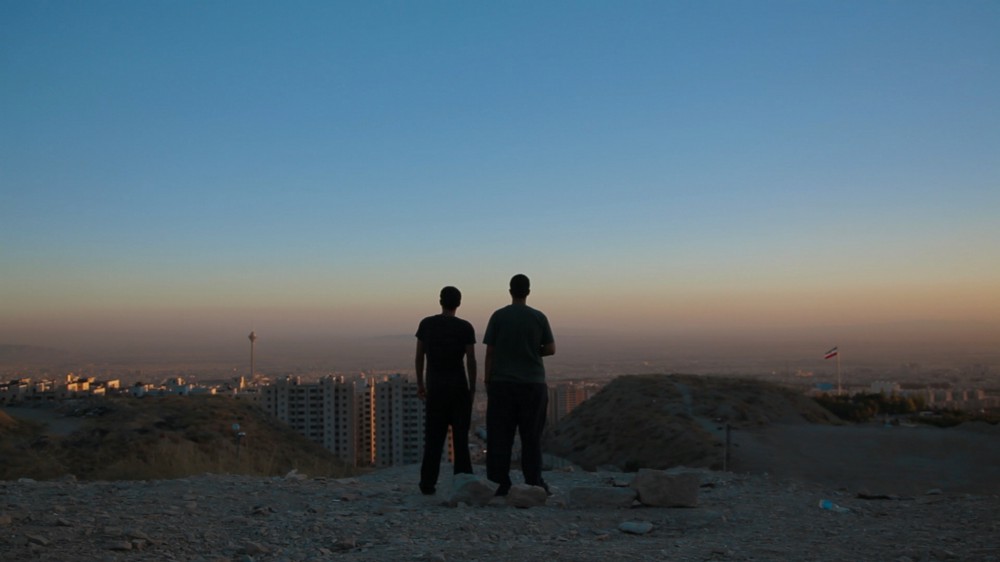Susanne Regina Meures was born in west Germany. She studied photography and art history at The Courtauld in London and film at the Zurich University of the Arts. She worked for numerous print publications before moving to film. “Raving Iran” is her first feature length documentary. (Press materials)
“Raving Ivan” will premiere at the 2016 Hot Docs Film Festival on May 1.
W&H: Describe the film for us in your own words.
SRM: “Raving Iran” takes the audience to the Islamic Republic of Iran, just a few months after Rohani’s election and confronts the audience with the dreams, illusions, and hard facts of the Iranian youth in the 21st century. It’s an odyssey of two young, Iranian DJs who are at the center of Tehran’s underground techno scene and follows their troublesome day-to-day life in the Islamic Republic of Iran.
However, tired of hiding from the omnipresent police squats and their stagnating career, Anoosh and Arash are planning to flee Iran. With our undercover camera we meet face-to-face with Iran’s illegal immigrant mafia. Leaving the country illegally is hideously expensive and this is where the journey of the two boys begins.
W&H: What drew you to this story?
SRM: I read a short article in an English magazine about hedonistic techno parties in the Iranian desert. I got this picture in my head of these small colorful “Burning Man” type festivals — an image of ecstatic, colourful kids in the Persian desert, dancing their personal utopia under the bribed eye of one of the most oppressive political systems in the world.
My motivation to start the arduous journey of making this film under very difficult and dangerous circumstances was the fact that is was bringing together a wide variety of aspects. On the obvious level it was the highly visual mixture of “sex, drugs, and rock ’n’ roll” with politics and zeitgeist, filmed in the Islamic Republic of Iran.
On a more subtle level, I was interested in the questions which arose especially once I started working with my protagonists.
W&H: What do you want people to think about when they are leaving the theater?
SRM: The film leaves you with no answers but the viewer is probably confronted with questions like:
How much self-determination and responsibility is needed to lead a happy life?
What are the ingredients for a content life?
Furthermore, my intentions are to unveil the mystified and cliched image of the Iranian youth, which is omnipresent in Western media. The majority of them live a life between those two worlds and display in many ways a much more authentic picture of the real dilemma the youth in Iran are facing.
I would like to share my observations of this generation, which can be characterized as hedonistic, a-political, and paralyzed. I would like to challenge the perception the audience might have of Iranian youth.
W&H: What was the biggest challenge in making the film?
SRM: Making this film was a quite a challenge from the start. First of all, it was difficult to gain access and find the kids who are throwing these parties and ultimately gain their trust. I was lucky to finally find Anoosh and Arash, who decided to talk openly about their passion and were fine with being filmed, despite the immense risk!
The whole shooting process was difficult, too. I was shooting without permission, plus I had to enter the country several times. I never knew if [the country] would issue yet another tourist visa.
I wasn’t able to take any equipment to Iran apart from a small photo camera. My sound equipment got confiscated straight away. Luckily, I sent it by courier and no one could trace it back to my name.
I had no place to stay; my friends weren’t able to host me because it was too risky for them. Hotels weren’t an option either. I called the church and we stayed for a few days before they kindly asked us to leave, feeling uncomfortable with what I was doing. I ended up staying on someone’s floor for months.
We constantly got stopped by the police. After shooting, I always replaced the memory card with the footage with a card with tourist shots. I hid the memory card with the footage in my bra. For quite a few scenes I used an iPhone, which I hid in a bespoke tailored shirt.
Another problem was getting the footage out of the country. I ended up paying Iranian students who were studying abroad to take the hard drives with them. The footage ended up all over Europe, from where I couriered it back to Zurich.
W&H: How did you get your film funded? Share some insights into how you got the film made.
SRM: The film got funded by the Ministry of Culture of Switzerland, The Zurich Film Foundation, quite a few other film funds, and the Zurich University of Arts, who are the Co-Producers.
W&H: What’s the best and worst advice you’ve received?
SRM: Best advice: Be patient.
Worst advice: None.
W&H: What advice do you have for other female directors?
SRM: Just do it!
W&H: Name your favorite woman-directed film and why.
SRM: I don’t have a favorite film. There are so many good films out there.







